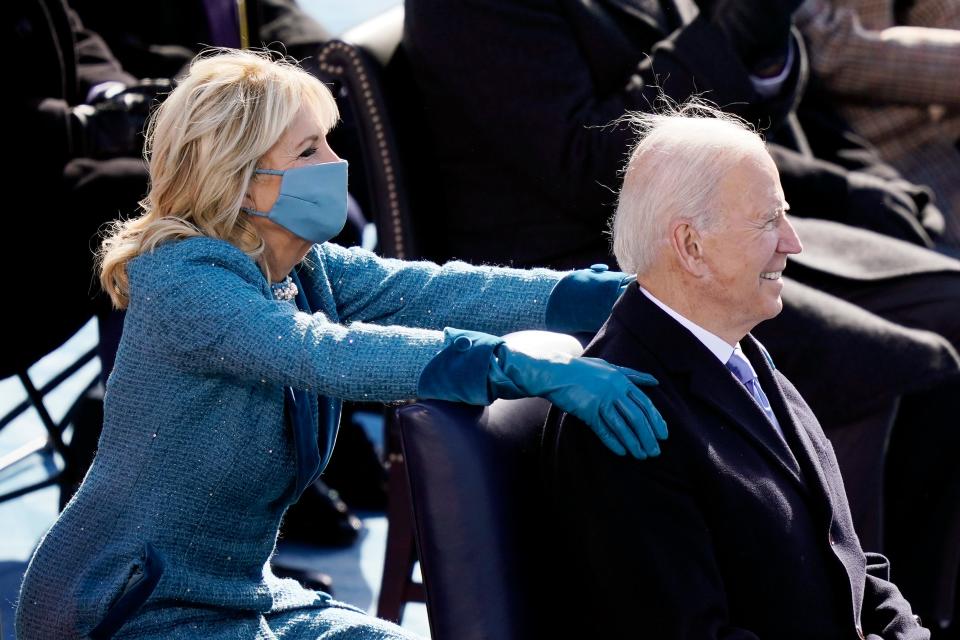Conservatives like me found lots to like in Biden's inaugural address. Will he deliver?
Thomas Jefferson’s inauguration in 1801 has been on my mind for the last few days. Not only was it the first inaugural address to be delivered in Washington, D.C. and the first to be followed by a parade to the White House, it was the first after a particularly bitter election that ended up going to the House of Representatives.
The inauguration that followed that vote marked the first peaceful transition of power from one party to another, and Jefferson gave one of the greatest inaugural speeches in American history. All eyes were on the new president as he extended an olive branch to his opponent, John Adams: “We are all Republicans, we are all Federalists.” It turned out Jefferson’s opponents liked the speech better than his supporters did.
As a conservative, I was hoping President Joe Biden would do the same in his inaugural address.
I’d bet that like me, most Republicans were relieved when Biden took a pass on getting too partisan. He used the words “unity,” “uniting,” “united” and “union” a total of 15 times in 20 minutes, and referenced the importance of our democracy more than ten times. He gave credit to the heroes who ensured that the attack on the Capitol did not stop our democracy: “It will never happen. Not today, not tomorrow, not ever.”
A president for all Americans
In quoting Saint Augustine, Biden called out the “common objects we as Americans love,” namely opportunity, security, liberty, dignity, respect, honor and truth. There’s not a Republican who disagrees with anything on that list. Let’s hope Biden’s policies remain true to those principles. There are plenty on the left whose agenda seeks to limit the liberty, opportunity and security of Americans.
Biden quoted Abraham Lincoln, the father of the Republican Party, when he promised that like Lincoln, his “whole soul is in this” — that is, the cause of bringing America together and uniting our nation under those shared values. He seemed to be aware of all the people who voted a split ticket: the ones who wanted a return to normalcy at the top of the ticket but are concerned about the growing size and scope of government everywhere else.
Best of all — at least for those of us in the loyal opposition — he made a point of pledging to be a president for all Americans, and promised to fight just as hard for those who did not support him as for those who did. He’d be smart to keep that promise.

I also listened to Biden’s address as a former presidential speechwriter and one who teaches political speechwriting at the college level. In class, we view Inaugural addresses as one-offs. The ancient Greeks would call them examples of epideictic rhetoric — the kind of lofty, elevated language not used in everyday language, which is what makes them fun. But Biden made it clear beforehand that he’s a plainspoken guy, and not to expect any high oratory.
Inauguration Day: President Joe Biden addresses tough cures for the disease of disunity
Overall, the speech captured Biden’s voice authentically and was well-crafted. The Greek rhetorical devices of ethos, logos, and pathos (appeals to authority, logic and emotion) were all there. It had the classic structure of a persuasive political speech: an attention-getting opening, a clear problem, a proposed solution, visualization of a better future, and a compelling call to action. Rather than persuading viewers to sign on to a partisan agenda, however, Biden argued for an end to “this uncivil war.” That persuasive structure is more common in a political speech and is unusual in an Inaugural address. But these are unusual times.
One and done is not enough
In speechwriting class, I warn my students against “The Coach K Miscalculation.” Named after Duke basketball’s Coach Mike Krzyzewski, the rule is a warning against thinking that by giving a speech you are “one and done.” Inspiring policy change is often a long process that involves not just a public speech but everything from behind-the-scenes diplomacy to building coalitions to enacting legislation.
The point is that speechwriters like me are the first to say that words matter … but actions matter even more.
Mastio & Lawrence: Joe Biden, Kamala Harris and reaching for normal at the inauguration
As President Biden starts his first 100 days, many of us are watching to see if his actions match the promises he made in his inaugural address. There are millions of conservatives who will be keeping a close eye — on his first executive orders, his legislative agenda, his staff appointments — to see if he himself succeeds at doing what he asked us to do: “Start afresh, all of us.”
Years ago, on Jan. 20, 1989, my former boss President George H.W. Bush left behind a note for his successor, President Bill Clinton. In it, Bush wrote, “Your success is now our country’s success. I am rooting hard for you.”
Joe Biden’s success is now our country’s success. All of us should all be rooting hard for him.
Mary Kate Cary (@mkcary), a former speechwriter for President George H.W. Bush, teaches political speechwriting at the University of Virginia and is a Senior Fellow for Presidential Studies at UVA’s Miller Center.
You can read diverse opinions from our Board of Contributors and other writers on the Opinion front page, on Twitter @usatodayopinion and in our daily Opinion newsletter. To respond to a column, submit a comment to letters@usatoday.com.
This article originally appeared on USA TODAY: President Joe Biden raised conservative hopes for a united America

 Yahoo Movies
Yahoo Movies 
